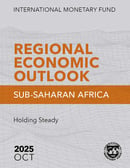This web page provides information in on the activities of the Office, views of the IMF staff, and the relations between Côte d'Ivoire and the IMF. Côte d'Ivoire and IMF country page, including official IMF reports and Executive Board documents in English and French that deal with Côte d'Ivoire.
At A Glance
- Current IMF membership: 191 countries
- Côte d'Ivoire joined the Fund in March 11, 1963 - Article VIII.
- Total Quotas: SDR 650.4 Million
- Article IV /Country Report completed May 31, 2022: Press release No. 2022/205
Office Activities
IMF Resident Representative Retreat, January 21-23, 2019
February 22, 2019
February 21, 2019
February 21, 2019
Article from La Tribune de l’économie, July 30, 2018 (in French).
July 30, 2018
“Jose Gijon: ‘More tax revenue is needed’”
Article from Fraternité Matin, in the Context of the Conference “Economic Perspectives in Africa 2018”, June 15, 2018 (in French)
June 15, 2018
Article from Fraternité Matin, May 31, 2018 (in French)
May 31, 2018
Article from Fraternité Matin, May 30, 2018 (in French)
May 30, 2018
Article from Fraternité Matin, May 28, 2018 (in French)
May 28, 2018
Côte d'Ivoire and the IMF
No results found. Either there was an error with the web service or there is no data returned by the web service.
Regional Economic Outlook
October 16, 2025

The outlook for Sub-Saharan Africa is showing resilience, despite a challenging external environment with uneven prospects in commodity prices, still tight borrowing conditions, and a deterioration of the global trade and aid landscape.
Read the Report
Fraudulent Scam Emails Using the Name of the IMF
For more information please see Fraudulent Scam Emails Using the Name of the IMF
Departmental Papers on Africa
 The Departmental African Paper Series covers research on sub-Saharan Africa conducted by International Monetary Fund (IMF) staff, particularly on issues of broad regional or cross-country interest. The views expressed in these papers are those of the author(s) and do not necessarily represent the views of the IMF, its Executive Board, or IMF Management.
The Departmental African Paper Series covers research on sub-Saharan Africa conducted by International Monetary Fund (IMF) staff, particularly on issues of broad regional or cross-country interest. The views expressed in these papers are those of the author(s) and do not necessarily represent the views of the IMF, its Executive Board, or IMF Management.



